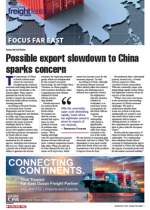n recent months, China's once mighty economic engine has shown signs of sputtering, raising concerns on a global scale. The slowdown in the Chinese economy, characterised by stagnant growth and surging unemployment, particularly among the youth, has sent shockwaves across various sectors. This predicament has serious implications, not only for China but also for nations, including South Africa, that have strong trade ties with the world's second-largest economy.The sudden and alarming spike in youth unemployment, with some urban areas grappling with rates as high as 20%, holds serious concern, while the real estate industry, which played a pivotal role in China's growth story, now faces immense challenges. Considering that approximately 70% of Chinese household wealth is intricately linked with the real estate sector, a substantial slowdown in this industry is beginning to have a ripple effect on various other facets of the economy. This has all resulted in a drop in domestic consumer demand, contributing to a bleak economic outlook.Already China's imports have exhibited signs of weakness, plummeting by 7.6% during the first seven months of 2023.According to Francois Fouche, an economist at Growth Diagnostics and the Centre for African Management and Markets at GIBS, the Chinese government's ambitious infrastructure plans, which require substantial imports of resources from countries like South Africa, have been significantly hampered by the country's fiscal constraints. “South Africa primarily exports commodities like gold, diamonds, and iron ore to China, and the declining trend in iron ore demand is a significant concern. Iron ore, SA's third-largest export to China, is a crucial input for real estate development. As the real estate market in China slumps, it's likely that less iron ore will f low from South Africa.”Examining diamond exports to China, the escalating levels of youth unemployment could also exert an inf luence, as the spending on jewellery is no longer a top priority.

